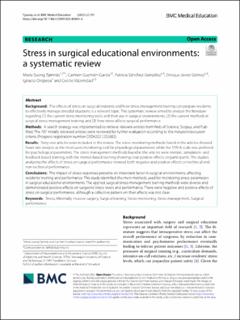| dc.contributor.author | Tjønnås, Maria Suong | |
| dc.contributor.author | Guzmán-García, Carmen | |
| dc.contributor.author | Sánchez-González, Patricia | |
| dc.contributor.author | Gómez, Enrique Javier | |
| dc.contributor.author | Oropesa, Ignacio | |
| dc.contributor.author | Våpenstad, Cecilie | |
| dc.date.accessioned | 2023-02-08T14:57:55Z | |
| dc.date.available | 2023-02-08T14:57:55Z | |
| dc.date.created | 2022-11-29T10:45:17Z | |
| dc.date.issued | 2022 | |
| dc.identifier.citation | BMC Medical Education. 2022, 22, 1-16. | en_US |
| dc.identifier.issn | 1472-6920 | |
| dc.identifier.uri | https://hdl.handle.net/11250/3049424 | |
| dc.description.abstract | Background
The effects of stress on surgical residents and how stress management training can prepare residents to effectively manage stressful situations is a relevant topic. This systematic review aimed to analyze the literature regarding (1) the current stress monitoring tools and their use in surgical environments, (2) the current methods in surgical stress management training, and (3) how stress affects surgical performance.
Methods
A search strategy was implemented to retrieve relevant articles from Web of Science, Scopus, and PubMed. The 787 initially retrieved articles were reviewed for further evaluation according to the inclusion/exclusion criteria (Prospero registration number CRD42021252682).
Results
Sixty-one articles were included in the review. The stress monitoring methods found in the articles showed heart rate analysis as the most used monitoring tool for physiological parameters while the STAI-6 scale was preferred for psychological parameters. The stress management methods found in the articles were mental-, simulation- and feedback-based training, with the mental-based training showing clear positive effects on participants. The studies analyzing the effects of stress on surgical performance showed both negative and positive effects on technical and non-technical performance.
Conclusions
The impact of stress responses presents an important factor in surgical environments, affecting residents’ training and performance. This study identified the main methods used for monitoring stress parameters in surgical educational environments. The applied surgical stress management training methods were diverse and demonstrated positive effects on surgeons’ stress levels and performance. There were negative and positive effects of stress on surgical performance, although a collective pattern on their effects was not clear. | en_US |
| dc.language.iso | eng | en_US |
| dc.publisher | Springer Nature/BMC | en_US |
| dc.rights | Navngivelse 4.0 Internasjonal | * |
| dc.rights.uri | http://creativecommons.org/licenses/by/4.0/deed.no | * |
| dc.subject | Medisinsk utdanning | en_US |
| dc.subject | Medical education | en_US |
| dc.subject | Surgical performance | en_US |
| dc.subject | Stress management | en_US |
| dc.subject | Stress monitoring | en_US |
| dc.subject | Surgical training | en_US |
| dc.subject | Minimally invasive surgery | en_US |
| dc.title | Stress in surgical educational environments: a systematic review | en_US |
| dc.title.alternative | Stress in surgical educational environments: a systematic review | en_US |
| dc.type | Peer reviewed | en_US |
| dc.type | Journal article | en_US |
| dc.description.version | publishedVersion | en_US |
| dc.rights.holder | © The Author(s) 2022 | en_US |
| dc.source.pagenumber | 16 | en_US |
| dc.source.volume | 22 | en_US |
| dc.source.journal | BMC Medical Education | en_US |
| dc.identifier.doi | 10.1186/s12909-022-03841-6 | |
| dc.identifier.cristin | 2083668 | |
| dc.source.articlenumber | 791 | en_US |
| cristin.ispublished | true | |
| cristin.fulltext | original | |
| cristin.qualitycode | 1 | |

